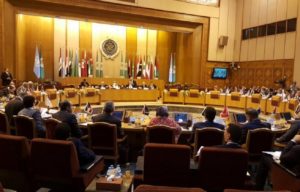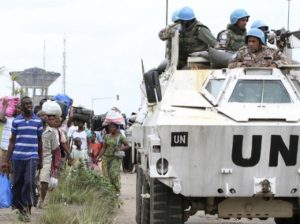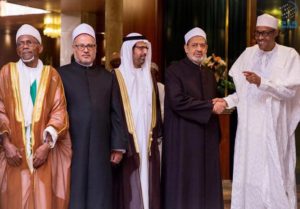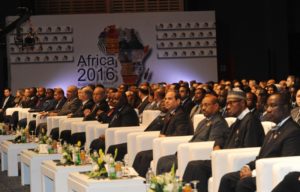Egypt’s Leading Diplomatic Role in Africa
Annual Africa Day celebrations hold special significance for Egypt this year. Marked on 25 May, Africa Day 2016 coincides with Egypt’s presidency of the United Nations Security Council and its two-year term as one of the Council’s representatives from Africa. It also intersects with Egypt’s representation of North African countries on the African Union’s Peace and Security Council. Combing these two seats positioned Egypt at the center of both regional and international peace efforts.
Egypt proactively pursued these global leadership roles to advance our nation’s unwavering commitment to the security and prosperity of our African neighbors as well to serve as an advocate for the continent on the international stage. Egypt is following through its longstanding promise to fight terrorism, and enhance the diplomatic, security development and economic prospects of nations on the continent.
During our month-long UN Security Council presidency, Egypt has been an important diplomatic voice for Africa, presiding over discussions ranging from the critical importance of cooperation between the Governments of Sudan and South Sudan to defeating the terror threat that confronts Africa and beyond. Egypt has overseen the adoption of a resolution demanding an end to impunity for those who attack medical facilities and personnel in conflict areas and helped produce statements condemning Boko Haram’s ongoing offensive in the Lake Chad Basin region. We also facilitated a debate on strategies to counter the narratives and ideologies of terrorism. This day-long session, chaired by Egypt’s Foreign Minister Sameh Shoukry, led to the UN Security Council adopting a presidential statement highlighting the importance of countering the false narratives and distorted ideologies terrorist groups use to recruit adherents in African and around the world.
Under Egypt’s leadership, the UN Security Council also held an unprecedented consultative meeting in Cairo with the Arab League. During the 21st of May meeting, representatives discussed the situation in Libya and Somalia, the Middle East peace process, and the challenge posed by surging numbers of refugees and displaced persons. The UN Security Council also traveled to Kenya and Somalia, where members discussed the implementation of “Vision 2016” of Somalia, and its upcoming elections in August.
The same week as we celebrate Africa Day, Egypt participated in the annual joint meeting of the UN Security Council and the African Union’s Peace and Security Council. A central focus of the gathering was bolstering United Nations-African Union cooperation and improve security across the continent. To this end, the Security Council issued a statement drafted and circulated by Egypt that called for progress in operationalizing the African Peace and Security Architecture and deploying strategies to increase cooperation between the African Union and the UN, particularly in conflict prevention, crisis management, and resolution.
To match this diplomatic resolve with strengthened peace and security efforts on the ground, Egypt contributes extensively to the training of African experts involved in peace operations, through the Cairo Centre for Conflict Resolution and Peacekeeping in Africa (CCCPA). Established by the Egyptian Ministry of Foreign Affairs in 1994, CCCPA is an important African Union training center of excellence. It has been mandated since 2010 to train the North Africa Brigade of the African Standby Force as well as provide training courses to the African Union Mission in Somalia. Meanwhile, Egypt also participates in all nine current Africa-based UN peacekeeping operations, contributing nearly 3,000 troops and police officers. In total, Egypt has taken part in 22 UN peacekeeping operations across Africa since 1960.
We all know that achieving enduring peace and security in Africa requires also addressing the root causes of terrorism. Egypt is central to this effort, serving as a global beacon for moderation and tolerance, the promotion of which is a critical tool for countering the insidious ideologies that inspire extremism not only in Africa but across the world. President Abdel Fattah El Sisi has made this central focus of his presidency. He has engaged closely with Al-Azhar University in Cairo, the most prestigious center of Islamic learning in the world, to encourage its clergy to reaffirm the true tolerant values of Islam and reform an often toxic religious discourse. In pursuit of this goal, the Grand Imam of Al-Azhar, Dr. Ahmed El Tayeb, recently traveled to Senegal and Nigeria where he held several high-level meetings and public events to promote the values of tolerance and co-existence while also condemning the activity of terrorists in Africa and beyond.
Egypt is also helping to build the policies, capacity and institutions African nations need to address other 21st century challenges such as climate change. In preparation for the historic Paris Climate Conference in 2015, Egypt chaired the Committee of African Heads of States and Government on Climate Change. In this role, Egypt expressed the need to balance action with protecting African nations’ right to development and poverty eradication. The resulting Paris Agreement, which Egypt signed in April, includes a plan to provide $100 billion to developing nations in Africa and beyond. The agreement could not have come soon enough. Recent El Niño droughts in East Africa underscore the devastating impact that climate change is having on the African continent. Egypt is a key contributor to the international effort aimed at alleviating this dire situation and has contributed $1 million in aid to the UN Food and Agriculture Organization’s (FAO) response plan.
Egypt is playing a central role in advancing Pan-African institutions. Chief amongst those is the Pan-African Parliament, which recently swore in five new members from Egypt. Egypt aims to take a leading role in the Pan-African Parliament to help resolve regional crises and address common challenges with joint solutions. In October, Egypt will host a session of the Pan-African Parliament in Sharm el-Sheikh for this purpose.
These international diplomatic and regional security efforts must also be paired with building the kind of enduring prosperity that promotes long-term stability. In 2014 our government established the Egyptian Agency of Partnership for Development (EADP), which inherited the 30-year-old Fund for Technical Cooperation in Africa. The new agency embodies our commitments to development across Africa, which in turn anchor peace and stability across the continent. Since its inception, the EADP has launched major initiatives that address chronic economic underdevelopment and the challenges confronting the nations and communities that are adversely affected by debilitating conflict. EADP’s main focus is to support peacebuilding efforts specifically related to improving security, health, and education and to promoting women’s empowerment initiatives. These programs include enhancing health networks across the continent and helping address the 2014 Ebola outbreak in West Africa. EADP also assists African countries meet their national development agendas. To date, it has introduced hundreds of scholarships and specialized training programs in 45 African countries.
As the continent’s second largest economy, Egypt is committed to extending the promise of prosperity to all Africans. We are taking a leading role in expanding trade and economic opportunity across the continent. Nearly one year ago, 26 African nations met in Egypt to sign a historic agreement to establish the largest free trade zone on the continent between three of its economic blocs SADC, EAC, and COMESA, covering 26 countries and more than 600 million people. The Tripartite Free Trade Area (TFTA) will eventually ease how goods are moved across member countries, which account for over half of the continent’s GDP, while also establishing a new framework for tariffs. To build on this historic trade agreement and further position Egypt as an economic gateway to and key investor in Africa, earlier this year Egypt held the “Invest in Africa 2016” summit in Sharm al-Sheikh. More than 1,200 delegates including several African presidents and heads of governments were on hand to enhance trade and investment in a rising economic region of the world. Currently, Egypt’s total investments across Africa equal $8 billion with trade volume reaching $5 billion, an amount that President El Sisi has pledged to double over the next five years.
As Egypt’s Ambassador to the United States, I am proud to not only enhance bilateral relations between Egypt and America but also to promote our common interests wherever they might be. Africa is certainly a region where these interests align, and where — as we commemorate the 53rd anniversary of the founding of the Organization of African Unity — Egypt will continue to utilize its leadership role to promote stability, security and prosperity for all.




